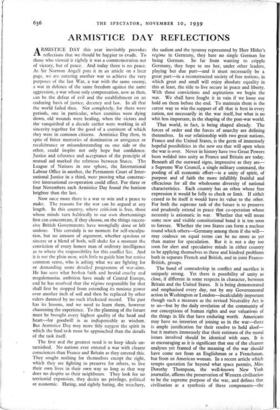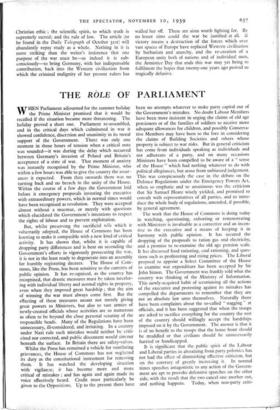ARMISTICE DAY REFLECTIONS
ARMISTICE DAY this year inevitably provokes reflections that we should be happier to evade. To those who viewed it rightly it was a commemoration not of victory, but of peace. And today there is no peace. As Sir Norman Angell puts it in an article on a later page, we are entering another war to achieve the very purposes of the last War, a war with the same enemy, a war in defence of the same freedom against the same aggression, a war whose only compensation, now as then, can be the defeat of evil and the establishment on an enduring basis of justice, decency and law. In all that the world failed then. Not completely, for there were periods, one in particular, when enmities were dying down, old wounds were healing, when the victors and the vanquished of a decade earlier were working in all sincerity together for the good of a continent of which they were in common citizens. Armistice Day then, in spite of bitter memories of domination or arrogance or recalcitrance or misunderstanding on one side or the other, could inspire not only hope but confidence. justice and tolerance and acceptance of the principle of mutual aid marked the relations between States. The League of Nations in one sphere, the International Labour Office in another, the Permanent Court of Inter- national Justice in a third, were proving what construc- tive international co-operation could effect. For three or four Novembers each Armistice Day found the horizon brighter than the last.
Now once more there is a war to win and a peace to make. The reasons for the war can be argued at any length. In this country, where criticism is free, those whose minds turn habitually to our own shortcomings first can concentrate, if they choose, on the things succes- sive British Governments have wrongfully done or left undone. This certainly is no moment for self-exculpa- tion, but no amount of argument, whether specious or sincere or a blend of both, will shake for a moment the conviction of every honest man of ordinary intelligence as to where the responsibility for this conflict lies. And it is not the plain man, with little to guide him but native common sense, who is asking what we are fighting for or demanding some detailed programme of war-aims. He has seen what broken faith and bestial cruelty and megalomaniac ambition have made of Central Europe, and he has resolved that the regime responsible for that shall first be stopped from extending its noxious power over another inch of soil and then be replaced by other rulers damned by no such blackened record. The past has its lessons, and we need to learn them, however chastening the experience. To the planning of the future must be brought every highest quality of the head and heart—for goodwill is as indispensable as wisdom. But Armistice Day may more fitly suggest the spirit in which the final task must be approached than the details of the task itself.
The first and the greatest need is to keep ideals un- tarnished. No nations ever entered a war with clearer consciences than France and Britain as they entered this. They sought nothing for themselves except the right, which they are fighting to preserve for others, to live their own lives in their own way so long as that way does no despite to their neighbours. They look for no territorial expansion, they desire no privilege, political or economic. Hating, and rightly hating, the treachery, the sadism and the tyranny represented by Herr Hitler's regime in Germany, they hate no single German for being German. So far from wanting to cripple Germany, they hope to see her, under other leaders, playing her due part—and it must necessarily be a great part—in a reconstructed society of free nations, in which great and small will enjoy absolute equality in this at least, the title to live secure in peace and liberty. With those convictions and aspirations we begin the war. We shall have fought it in vain if we loose our hold on them before the end. To maintain them is the surest way to win the support of all that is best in every nation, not necessarily in the war itself, but what is no whit less important, in the shaping of the post-war world.
That world, in fact, is being shaped already. The forces of order and the forces of anarchy are defining themselves. In our relationship with two great nations, France and the United States, is the germ of immensely hopeful possibilities in the new era that will open when the war is over. Never in history have two Great Powers been welded into unity as France and Britain are today. Beneath all the outward signs, impressive as they are- a Supreme War Council, a single military command, the pooling of all economic effort—is a unity of spirit, of purpose and of faith the more infallibly fruitful and efficacious for all the wholesome diversity of national characteristics. Each country has an ethos whose free expression it would be folly to check or limit. If either ceased to be itself it would have its value to the other. For both the supreme task of the future is to preserve and prudently extend in peace that co-operation whose necessity is axiomatic in war. Whether that will mean some new and visible constitutional bond it is too soon to foresee. Whether the two States can form a nucleus round which others—Germany among them if she will— may coalesce on equal terms can be no more as yet than matter for speculation. But it is not a day too soon for alert and speculative minds in either country to be applying themselves to these and kindred problems both in separate French and British, and in joint Franco- British, groups.
The bond of comradeship in conflict and sacrifice is uniquely strong. Yet there is possibility of unity as close, if different in some respects in character, between Britain and the United States. It is being demonstrated and emphasised every day, not by any Governmental action in Washington or London—incalculably important though such a measure as the revised Neutrality Act is to us—but by the daily revelation of the community of our conceptions of human rights and our valuations of the things in life that have enduring worth. Americans may have no intention of joining us in the war—there is ample justification for their resolve to hold aloof— but it matters immensely that their estimate of the moral issues involved should be identical with ours. It is as encouraging as it is significant that one of the clearest analyses yet framed of the meaning of the war should have come not from an Englishman or a Frenchman, but from an American woman. In a recent article which tempts quotation far beyond what space permits, Miss Dorothy Thompson, the well-known New York journalist, affirms the preservation of Western civilisation to be the supreme purpose of the war, and defines that civilisation as a synthesis of three components—the Christian ethic ; the scientific spirit, to which truth is supremely sacred; and the rule of law. The article (to be found in the Daily Telegraph of October 31st) will abundantly repay study as a whole. Nothing in it is more striking than the writer's insistence that one purpose of the war must be—as indeed it is sub- consciously—to bring Germany, with her indispensable contribution, back into the Western civilisation from which the criminal malignity of her present rulers has walled her off. These are aims worth fighting for. By no lesser aims could the war be justified at all. if victory means a destruction of the forces which over vast spaces of Europe have replaced Western civilisation by barbarism and anarchy, and the re-creation of a European unity both of nations and of individual men, the Armistice Day that ends this war may yet bring to fulfilment the hopes that twenty-one years ago proved so tragically delusive.





































 Previous page
Previous page